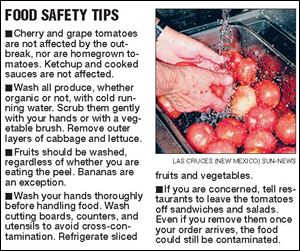
Salmonella scare slashes some tomatoes from diets
6/10/2008
LOS ANGELES - Tomatoes disappeared from cheeseburgers. Fresh salsa was suddenly in short supply. Supermarket vegetable aisles were in disarray. Homemakers checked the fridge and waiters were pressed to explain why certain menu items were unavailable.
Tomatoes tanked yesterday as the nation's restaurants, supermarkets, and consumers coped with concerns of a widening outbreak of salmonella.
Over the weekend, the federal government expanded warnings to include 16 states. The U.S. Food and Drug Administration urged consumers to avoid three varieties of tomatoes - Roma, plum, and red round.
Tomatoes have been responsible for illnesses in at least 16 states. The Centers for Disease Control and Prevention has said that since mid-April, 145 people infected with salmonella with the same "genetic fingerprint" have been identified.
At least 23 people have been hospitalized, but no deaths have been reported.
The nation's largest restaurateur, McDonald's Corp., joined thousands of other retailers yesterday by taking sliced tomatoes off sandwiches in its U.S. restaurants until health officials discover the source of the tainted tomatoes.
McDonald's will continue serving grape tomatoes in its salads because no problems have been linked to that variety, a spokesman said.
Kroger Co. on Sunday removed raw red plum, red Roma, and red round tomatoes from stores in 31 states, said spokesman Meghan Glynn. Last week, Cincinnati-based Kroger pulled the tomatoes from stores in Texas and New Mexico.
Ms. Glynn said yesterday that Kroger's action includes salsa, salad bars, and other products that use the suspect tomatoes.
Kroger still offers other tomato varieties, including grape, cherry, and vine-attached and homegrown tomatoes.
Wendy's International Inc. has also stopped serving many tomatoes as a precaution, said spokesman Denny Lynch. The nation's third-largest burger chain, based in suburban Columbus, halted use of sliced tomatoes nationwide as of yesterday. Grape tomatoes continue to be served in salads.
"We have heard of no issues or concerns with our supply; however, it is prudent to exercise extreme caution and to follow the [FDA] advisory, so we are," Mr. Lynch said.
Pennsylvania-based Giant Eagle, which has 223 supermarkets in western Pennsylvania, Ohio, West Virginia, and Maryland, said it has removed the tomatoes from store shelves.
Wal-Mart, Burger King, Outback Steakhouse, and Taco Bell were among other restaurants voluntarily withdrawing tomatoes from their menus.
Food safety officials scrambled to reassure consumers that many tomatoes were edible and that search efforts for the origin of the contaminated tomatoes had moved into high gear.
A rare strain of the microbe called "salmonella saintpaul" is suspected of causing 145 cases of illness since mid-April.
Salmonella is a bacteria usually transmitted to humans by eating foods contaminated with animal feces.
Most infected people suffer fever, diarrhea, and abdominal cramps starting 12 to 72 hours after infection. The illness tends to last four to seven days. Young children, frail, and elderly people and those with weakened immune systems are particularly at risk.
In Irvine, Calif., the head of the Food and Drug Administration, Dr. Andrew C. von Eschenbach, said that finding the source of the tainted tomatoes "could be a matter of a few days or even longer than that."
The FDA has ruled out tomatoes grown in a number of states. But because tomatoes come from across the nation and Mexico, it can be difficult to determine their origin.
The outbreak comes from tomatoes that could have been grown in a variety of places, the FDA chief said. He said consumers should avoid eating the varieties of tomatoes in question but could eat cherry and grape tomatoes as well as fruit directly removed from the vine.
The contamination could have been caused by such factors as dirty irrigation water or the tomatoes' proximity to animal feces, said Dr. Carl Winters, a food toxicologist and director of the FoodSafe program at the University of California, Davis.
Even thoroughly washing the tomatoes was no guarantee of protection. Under some conditions, salmonella bacteria can penetrate the skin of the fruit and grow inside, Dr. von Eschenbach said.
Texas and New Mexico account for 95 of the victims.